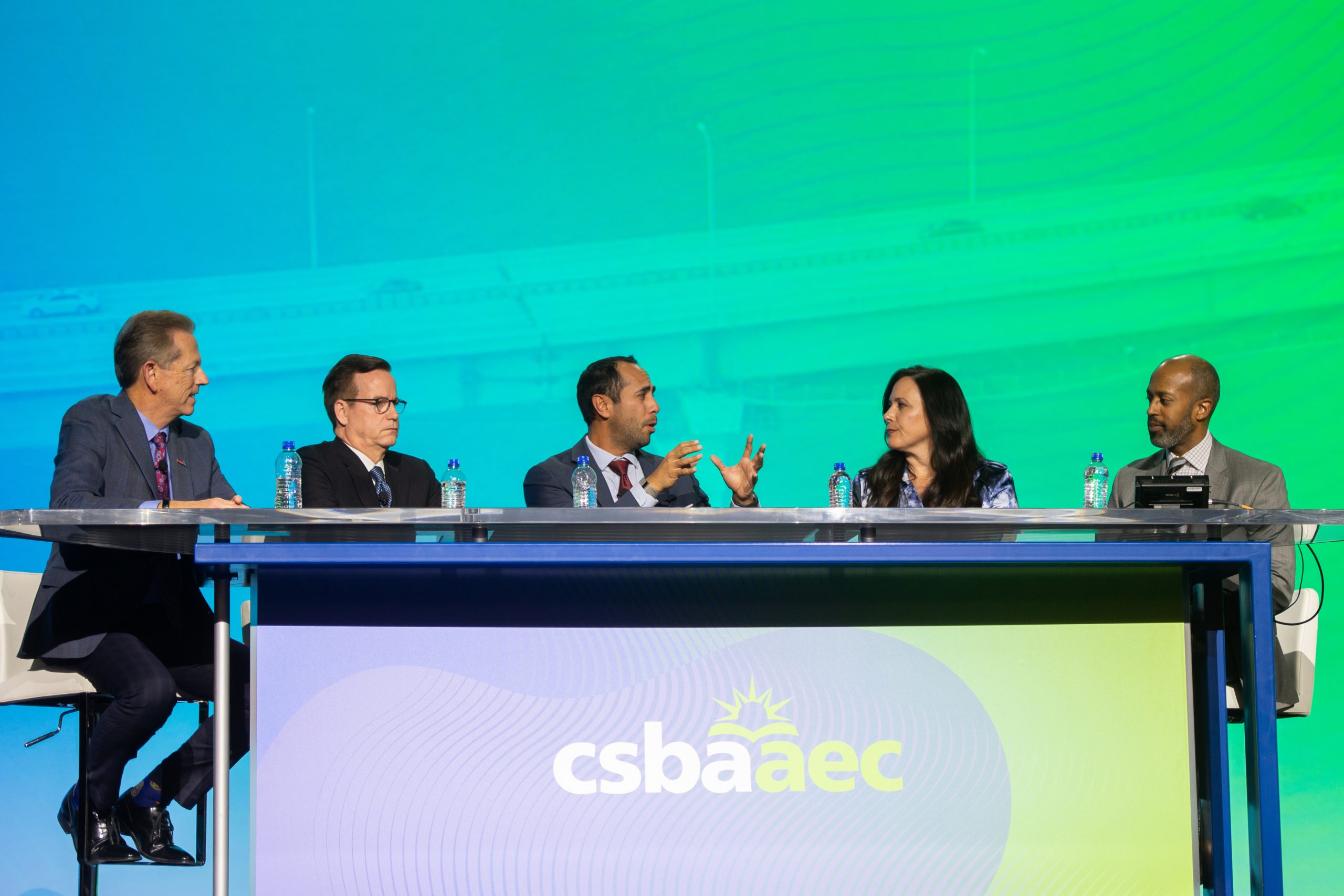CSBA’s 2022 Annual Education Conference and Trade Show in San Diego Dec. 1-3 attracted approximately 3,500 attendees, breaking recent attendance records, and included three insightful General Sessions featuring nationally acclaimed educator and award-winning author of Miseducated, Brandon P. Fleming; New York Times bestselling author of Educated, Tara Westover; and conversations with experts on education funding and the state of public schools hosted by CSBA CEO & Executive Director Vernon M. Billy.
The Second General Session kicked off with an economic forecast panel, “Beyond the Numbers: An Inside Look at Education Funding,” featured California Association of School Business Officials (CASBO) CEO Tatia Davenport and School Services of California President and CEO John Gray.
The panelists shared an overview of the economic forecast and priority advocacy areas for 2023, as well as a discussion on the key role of chief business officers in local educational agencies. Gray said that the run of economic prosperity the state has experienced since the Great Recession is “softening.” California is reliant on a very small population of earners — the top 1 percent — that contribute about half of the state’s revenue.
“We know, how goes the economy, so goes public school funding in this state,” he said. “The big thing out there impacting funding is inflation … One of the side effects of inflation is increasing interest rates.” This, in turn, affects the stock market and the spending behavior of those top earners. “Revenues have slowed, and they are coming in under projection,” said Gray. “The state is going to have a $25 billion deficit after having a large surplus.”
While declining enrollment amid this economic downturn is a concern, “this is not the time to panic,” Gray said, explaining that LEAs are on much better footing since the Great Recession with not only their own healthy reserves, but with a general state reserve and a Proposition 98 reserve.
The Legislative Analyst’s Office (LAO) is projecting a statutory cost-of-living adjustment (COLA) for Prop 98 of nearly 9 percent. Both panelists expressed concerns that the state might not be able to meet this crucial obligation. CASBO’s Davenport talked about the importance of not only advocating, but educating the Legislature on the importance of base funding. “By 2024, there will only be three legislators left who were around during the formation of LCFF and the LCAP,” she said. “We have a role to collectively advocate for all dollars to go to the base.”
The role of managing those different funding streams is reliant on an LEA’s chief business official (CBO). According to Davenport, about 200 of the state’s 1,000 CBOs are in their first two years of service and about 250 are in their last two years of service. “The call to action is this: If you have a CBO that is new to your environment, it is imperative that you invest in their professional development — education finance is incredibly complicated,” Davenport said. “On the other side, if you have a CBO who is retiring, make sure you put in a succession plan about a year ahead.”
The state of public schools
“The State of the State: A Pivotal Moment in Time for Public Schools” panel featured Billy in conversation with Capitol Advisors President and Partner Kevin Gordon, CSBA’s Assistant Executive Director of Governmental Relations Dennis Meyers, EdSource CEO Anne Vasquez and Association of California School Administrators (ACSA) Executive Director Edgar Zazueta discussing topics including mental health supports, community schools, staffing shortages, declining enrollment, the November election’s impact on public schools, recent assessment results, and future challenges and opportunities for boards.
Continuing a theme from the previous panel, Gordon highlighted underperforming state revenues, but found a silver lining — for the first time, the LAO report did not refer to Prop 98 as a ceiling. “We have to be vigilant and prepared to fight the good fight to whatever that COLA is that we are entitled to. When they only fund COLA, especially when it’s funded below inflation, it’s like standing still.”
COLA is not the only battle board members should prepare for though, according to Meyers. “Our real battle is outside of Prop 98 because there are things we did not get in the current budget year. We still have to fight for TK facilities, CalPERS and STRS and continuing to adjust Proposition 98 upward,” he said.
Zazueta reflected on the plethora of new initiatives that LEAs have implemented this year, and the challenges that come along with them. “It’s transitional kindergarten, universal meals, expanded learning — it’s all of these initiatives we all agree are good for kids. Now it’s about getting the implementation right at a time when we are now facing uncertainty in the budget.” On top of that, “we have some real human capital challenges,” continued Zazueta. “If you don’t have the people to serve the students — that’s the biggest issue.”
Switching gears, Billy asked EdSource’s Vasquez what the top education issues are from a journalism perspective. Vasquez named community schools, tutoring and reading instruction as the three top areas. “The pandemic really brought home the need for community schools, particularly in low-income communities and minority communities,” she said.
The panel also discussed this year’s dismal, if not unexpected, assessment scores. “We learned what we already knew — that the pandemic affected kids,” said Zazueta. “We were assessing at the height of the omicron wave with significant teacher shortages. I think it’s important to take that data in its proper context. We need to think of this as the new baseline.”
“Information is power, and it is really important to know where we stand,” added Vasquez.
Advocating in the new year
The panel recognized that a slew of new members are joining the Legislature. “Of the 120 legislators, there are not more than 15 or 20 who serve on any committee that deals with education,” Gordon said. “All the rest of them rely on you.”
“Here’s an opportunity to educate the new folks,” agreed Zazueta. “Elected officials will go to their school board to be their eyes and ears. We have this new responsibility and yes, advocate, but first by really setting that base line — educating them on what the state of schools is.”





